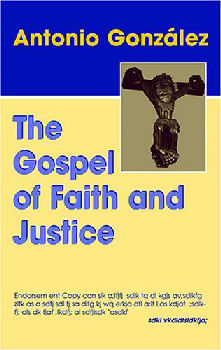
|
Posted February 21, 2006
Book: The Gospel of Faith and Justice Author: Antonio Gonzalez Orbis Books, Maryknoll, NY, 2005, pp. 179 An Excerpt from the Jacket:
Offering compelling new insights into this influential theology, The Gospel of Faith and Justice demonstrates how to live a radical Christianity, faithful to Jesus’ integration of faith and the call to social transformation. An Excerpt from the Book: Liberation theology had two great intuitions, which I continue to consider theologically valid: the so-called “perspective of the poor” and the “primacy of praxis.” From these intuitions there arose a new Christology, interested in showing, as had never been done up to that point, the theological relevance of Jesus’ practice of solidarity with the poorest people. Several christological themes then took on a decisive importance: 1. Above all, liberation theology emphasized Jesus’ involvement in the world of the poor, just as this involvement appears in the scriptures. It was an involvement that not only evinced the general solidarity with the human race that took place in the incarnation, but one that introduced into the world of the poor a transforming dynamism that aimed at a complete renewal of their reality. Christian salvation, from this point of view, could no longer be considered a purely spiritual process or simply an other-worldly fulfillment (and not just as a further consequence) a genuine transformation of social relationships now, and in this world. The perspective made possible new and fresh readings of the Bible. 2. Second, liberation theology emphasized that Jesus’ preaching was radically linked to the announcement of the imminent arrival of the reign of God. This was, of course, something that European exegesis had already pointed out much earlier. Jesus’ announcement of God’s reign, however, had represented for some theologians a serious problem, for evidently that reign had not arrived with the immediacy that Jesus had proclaimed. Liberation theology was able to take up that theme again and point out the social dimensions of God’s reign. In this way the growth of liberation movements in Latin America made the imminence of God’s reign, with all its social consequences, less of a theological problem: the reign announced by Jesus appeared on the verge of arriving. 3. Another christological dimension also came to the forefront. The practice and the message of Jesus brought him into conflict with the authorities of his time. In contrast to the traditional sentimental images of Jesus, liberation theology emphasized that Jesus’ solidarity with the poor and his announcement of God’s reign implied an inevitable clash with the most powerful. Such was surely the experience of many Christians, who began to pay a high price, often paying with their very lives, for the new pastoral orientation that liberation theology inspired. Table of Contents: 1. The continuing vitality of liberation theology 2. The Gospel of faith and justice 3. Matthew 25 and the hope of the poor 4. The proclamation of the reign of Jesus the Messiah 5. The pentecostal church of the poor 6. The reason for hope 7. The Trinitarian reign of the Christian God 8. Theology’s past and liberation’s future |
|
